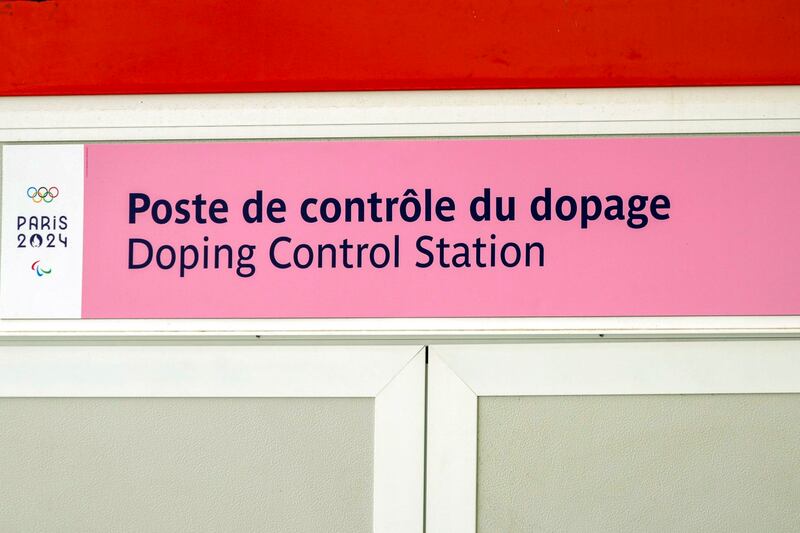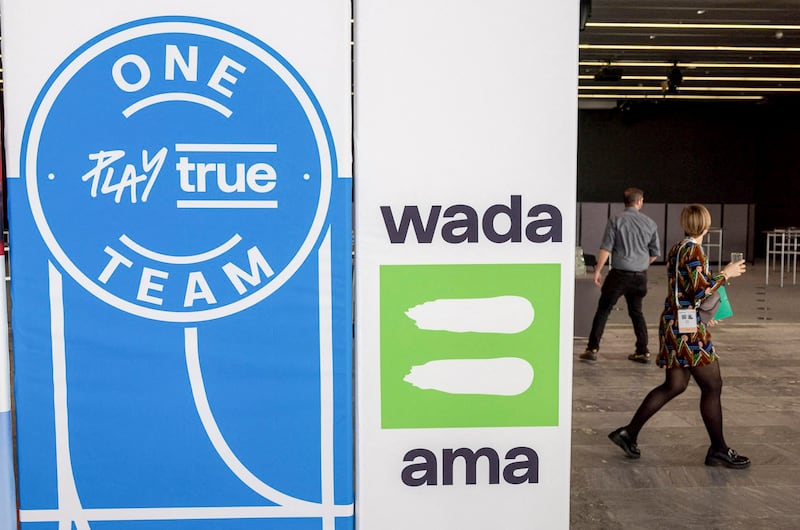A bipartisan group of U.S. lawmakers on Tuesday introduced legislation that would withhold funding from the world anti-doping body amid allegations that it has helped cover up rampant anabolic steroid use by Chinese swimmers competing at the Olympic Games.
The legislation would modify existing appropriations arrangements to allow the U.S. Office of National Drug Control Policy to withhold the $3.7 million the United States gives annually to the World Anti-Doping Agency, which is the most provided by any member country.
The threat comes as the International Olympic Committee has threatened to rescind Utah's Salt Lake City as the host of the 2034 Winter Olympics – and potentially even Los Angeles as the host of the next summer games in 2028 – for not accepting WADA's ruling.
In a press conference, Sen. Marsha Blackburn, a Republican from Tennessee and a co-sponsor of the bill, ridiculed China’s claims that a group of swimmers who tested positive for steroids after the 2020 Tokyo Olympics had eaten food contaminated in a hotel kitchen.
“Instead of opening an investigation into these allegations at that time, WADA blindly accepted the Chinese anti-doping agency’s excuse that the doping was unintentional and caused by food contamination,” Blackburn said, alleging special treatment for Chinese athletes.
“Now, 11 of those athletes are competing in the Paris Olympics, and not one of them has been held accountable,” she said.

The senator also pointed to a report published earlier Tuesday in The New York Times that said Chinese authorities cleared another two Olympians of steroid use in 2022 on the basis they ingested the drugs "unwittingly when they ate hamburgers at a restaurant in Beijing."
The report notes it was the third time in the past few years that Chinese authorities had blamed food contamination for positive steroid tests, but that WADA had nevertheless accepted the finding without appeal.
Beijing has said that the tests found only “trace” amounts of drugs.
‘Where’s the beef?’
Rep. Raja Krishnamoorthi, a Democrat from Illinois and a co-sponsor of the bill in the House of Representatives, said that he found it hard to believe that WADA had repeatedly accepted China’s claims of food contamination without ever pressing authorities there for proof.
“My first job in life was flipping burgers at McDonald’s, and I have to say, this investigation begs the question: Where’s the beef?” he said.
“It’s the third time they’ve come up with this lame food contamination excuse, and I think this is the first time I’ve heard about a hamburger containing anabolic steroids,” he added. “I don’t know what they’re mixing in their burgers in Beijing. But this is absolutely unacceptable.”
Liu Pengyu, a spokesperson for the Chinese Embassy in Washington, told Radio Free Asia that China’s government had “zero tolerance” to drugs in sports but said the targeting of Chinese athletes was only about “obstructing their participation in the Paris Olympics.”
“This non-existent case that the U.S. keeps selling and the threats it hurls at the international organization are all about degrading fine Chinese athletes,” Liu said, adding that the United States was acting as if it was above the “global anti-doping governance system.”
“We urge the U.S. lawmakers to respect the Olympic spirit, abide by international law and basic norms governing international relations, stop feeding the world with false narratives and stop manipulating perceptions by turning everything political,” he added.
‘Getting away with everything’
Sen. Chris Van Hollen, a Democrat from Maryland, said the legislation was necessary to ensure that WADA was fulfilling its duties to crack down on doping before more U.S. taxpayer funds were sent to it.

He noted that two of his Maryland constituents – 23-time gold-medal winning swimmer Michael Phelps and seven-time gold medallist Katie Ledecky, who is currently competing in her fourth Olympics – have raised concerns about the Chinese swim team’s practices.
In May, following WADA's handling of the Chinese doping cases, Ledecky told CBS that "our faith in some of the systems is at an all time low," while Phelps told a House committee last month he believed "people are just getting away with everything."
“We want to make sure that before the United States provides its contribution to WADA, we have assurances that the kind of the kind of activities that we came to learn about in April, are not happening,” Van Hollen said. “At the end of the day, we need a fair playing field.”
Take a moment to read more
[ Chinese social media users slam athletes over failure to deliver goldOpens in new window ]
[ Chinese dissidents in exile stage sporadic Olympic rights protests in ParisOpens in new window ]
[ China's Olympic team denies issues with summer heat in ParisOpens in new window ]
[Fact Check] Did a US swimmer dodge drug tests for the Paris Olympics?
Silver medalist
Also present at the press conference was Allison Wagner, a swimmer who won silver in the women’s 100 meters individual medley event at the 1996 Olympics, and has since become an anti-doping advocate.
At that year’s games in Atlanta, Wagner came second to Ireland’s Michelle Smith, who won three gold medals at the games and then retired from swimming – at the same time as being served a four-year ban from the sport for tampering with one of her drug tests.
Wagner also came second to Chinese swimmers involved in doping at world swimming championships earlier in the 1990s, and told reporters that her experiences had pushed her to speak out against drug use.
“Winning multiple silver medals at the highest level of competition to athletes later proven to have doped, I learned firsthand what kind of impact those experiences can have on an athlete’s life,” Wagner said.
“I learned that my integrity, dedication and sacrifices as an athlete were not valued and protected by those in positions of power,” she said. “Athletes deserve the global anti-doping system to reflect the dedication and integrity they demonstrate in competing clean.”
